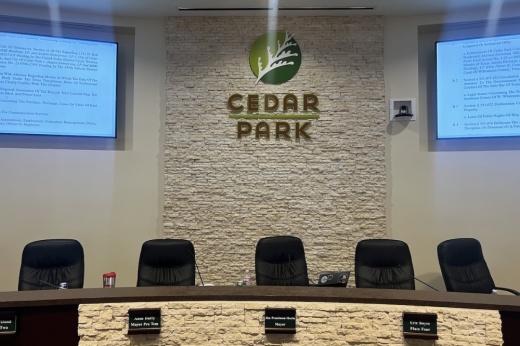This is the only contested Cedar Park City Council race this year. Incumbents Jim Penniman-Morin, Mel Kirkland and Heather Jefts were the only candidates to file for mayor, Place 2 and Place 6, respectively.
Cedar Park City Council members are elected at large, meaning each member represents the entire city, and qualified voters can cast ballots for all seats on council.
Early voting runs from April 22-30, and election day is May 4.
Read Q&As with Boyce and Endres below. Candidates were asked to keep responses to 75 words or fewer, answer the questions provided and avoid attacking opponents. Answers may have been edited or cut to adhere to those guidelines, or for style and clarity.
*indicates incumbent

Eric Boyce*
Experience:
2 terms council, Planning & Zoning Commission, Economic Development Corp, CP Regional Hospital Board, LEEF Board
Occupation:
CEO, Boyce & Associates Wealth Consulting, Inc.
Candidate Website:
https://www.ericforcedarpark.com
Why are you running for this position?
To continue providing our citizens with insightful, thoughtful and unbiased governance and leadership, to help execute our recently approved strategic plan, the second one I’ve worked on. Also, to leverage my business experience, my experience on city boards and commissions, as well as two terms on council, to provide fiscal discipline to city financial management, prudent expansion of essential services, oversight of annual and capital budgets, and management of our future land use plan.
If elected, what are your goals for the city of Cedar Park?
To execute on our current strategic plan, to maintain fiscal responsibility and our AAA debt rating, promote safe streets and neighborhoods through support of public safety growth and expansion, support small business, increase job opportunity, expand livability investments in parks and other amenities, re-engage transit pilot studies, as well as maintain the high quality of city services funded by the expansion of our tax base, which should help to keep property tax rates low.
What are some of the biggest challenges facing Cedar Park, and how would you work to address them?
Mobility, infrastructure and eventual redevelopment will all require continued thoughtful and proactive long-range planning, which we have already started working on as a council and staff. Major water infrastructure investments are well underway, based on not only the reality of our current climate and resources but also our projected future population. We will need to execute on our recently approved Master Mobility Plan, Economic Development strategic plan, and Phase I of the Bell District redevelopment.
How would you ensure infrastructure, such as water and roads, keeps up with population growth?
Current water infrastructure plans are based on a projected final build-out of [about] 130,000 residents. Any deviation from these forecasts will require increased spending; therefore, it is important to maintain the integrity of our future land use plan. Our capital improvement program continues to address required road maintenance, including intersections and neighborhoods. We’ve also addressed the need for major road extensions AND expansion via capital spending, multijurisdictional investments, and funding from the 2022 bond package.
What role does the city play in managing and guiding development?
Our comprehensive plan serves as a vision and guidepost for future expansion and development. Instituted by stakeholder input, it informs our future land use plan, strategic plan, as well as our master plans (parks, trails, mobility). These plans help to engineer an intricate balance between the infrastructure needs for a growing population and city services, public amenities, access, and transit. These plans also serve as decision filters for all proposed development within the city.

Michael Endres
Experience:
Parent and spouse, police supervisor and former detective, Marine Corps veteran, MBA, real estate broker
Occupation:
Police sergeant
Candidate Website:
https://www.mike4cedarpark.com
Why are you running for this position?
I want to help shape Cedar Park into the kind of safe, prosperous city that our kids someday want to return to and raise their own family. My vision is for people to go about their days without worrying about crime, have a vibrant local economy and employments that doesn’t require a long commute, see local government as an example of efficiency and transparency, and have outstanding, connected sidewalks and trails to get outdoors on.
If elected, what are your goals for the city of Cedar Park?
As a police sergeant, my natural focus is to maintain a high level of public safety. Laura and I moved to Cedar Park because it is a safe place to raise kids, and we want to keep it that way. We’d like to see a continually growing array of employment opportunities, entertainment, restaurants, and green spaces so that Cedar Park residents’ time, investment, and tax dollars can stay within the city.
What are some of the biggest challenges facing Cedar Park, and how would you work to address them?
One challenge is reducing the tax burden per resident. I’d address this by growing the tax base through allowing incrementally more productive uses of land. A second is reducing traffic congestion by making it easier for our employment locations and daily necessities to be located a shorter drive, if not a walkable distance from home. A third is increasing the variety of housing options, size ranges, and price points to make ownership more attainable.
How would you ensure infrastructure, such as water and roads, keeps up with population growth?
Reduce the need to drive as far by bringing amenities closer to home. This includes reforming land use rules to encourage and facilitate more businesses and jobs in Cedar Park, more scattered pockets of mixed use development like the Bell District and High Ridge, and walkable necessities like neighborhood day cares and corner grocery stores. I support projects like the Lake Travis deep water intake, maintaining water treatment capacity, and encouraging efficient water fixtures and usage.
What role does the city play in managing and guiding development?
Land use regulations determine how people live, work, and play. These regulations determine whether teachers can afford to live in the same city where they teach, whether businesses can find employees within driving range, and whether empty nesters can downsize across the street or have to look in another city farther away from their social circle. I firmly believe development and zoning rules should be responsive and adaptable to meet residents’ and business’s needs.





